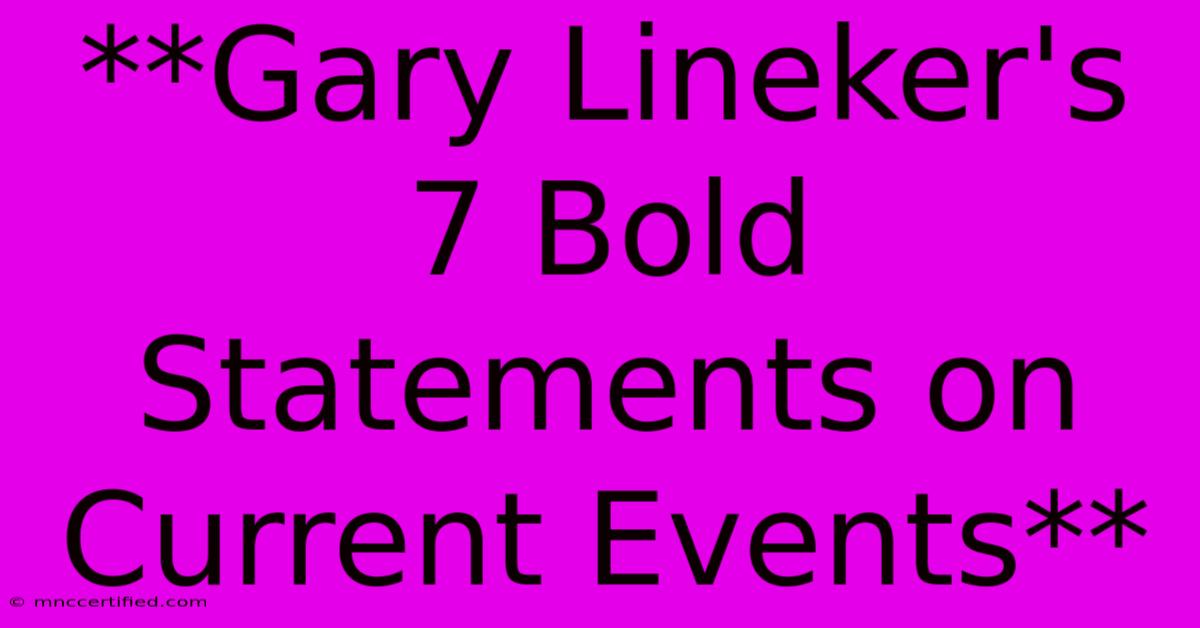**Gary Lineker's 7 Bold Statements On Current Events**

Table of Contents
Gary Lineker: 7 Bold Statements That Sparked Debate
Gary Lineker, the beloved former footballer and current BBC sports presenter, is known for his sharp wit and outspoken opinions. While his commentary on football is often insightful, Lineker's willingness to voice his thoughts on current events has often stirred controversy. Here are seven bold statements by Gary Lineker that sparked heated debate:
1. "This is not a 'culture war' – it's a war against the poor"
In a tweet referencing the government's proposed changes to the asylum system, Lineker argued that the policy was targeting vulnerable individuals. This ignited a fierce debate about the government's approach to immigration and the role of the BBC in political discussions. The statement highlighted Lineker's commitment to social justice and his willingness to challenge government policies he deems unfair.
2. "No one can accuse me of being impartial, I am a strong advocate for the rights of others"
Lineker, known for his progressive views, often uses his platform to advocate for marginalized groups. This statement, made during an interview on the BBC, openly declared his lack of impartiality and his strong belief in human rights. This candid declaration solidified his position as a vocal advocate for social justice and challenged traditional notions of neutrality in public broadcasting.
3. "We cannot allow refugees to be demonized. This is about human decency. And the law."
This tweet, condemning the portrayal of refugees as a threat, underscores Lineker's commitment to compassion and empathy. He uses his platform to counter negative narratives surrounding refugees, highlighting the importance of treating all people with dignity and respect. This statement drew support from many but also sparked criticism from those who held contrasting views on immigration.
4. "I'm not a politician, I'm a football presenter, but I'm not stupid"
Lineker often uses his platform to challenge those in power, even when his comments provoke controversy. This statement, made in response to criticism for his political views, highlighted his willingness to engage in political debate and defend his position. It also highlighted his belief in using his voice to advocate for social justice and challenge injustice, even when facing backlash.
5. "It's important to stand up for what you believe in. Even when it's unpopular."
This statement, shared on social media, encapsulates Lineker's dedication to his convictions. He uses his platform to speak out against injustice and advocate for social progress, even if his opinions differ from those of the majority. This principle is central to Lineker's approach to public discourse and underlines his willingness to challenge the status quo.
6. "There's a difference between being critical and being abusive"
In a tweet responding to criticism of his comments, Lineker emphasized the importance of respectful debate. This statement draws a clear distinction between constructive criticism and personal attacks, advocating for a more civil and respectful approach to public discourse. It highlights his commitment to open dialogue and his belief in the power of reasoned debate.
7. "We all have a responsibility to speak out against hatred and bigotry"
Lineker consistently uses his platform to promote tolerance and understanding. This statement underscores his belief in the importance of challenging prejudice and bigotry, emphasizing the collective responsibility to combat these harmful forces. It highlights his commitment to fostering a more inclusive and equitable society.
Conclusion
Gary Lineker's outspokenness, often expressed through his personal Twitter account, has made him a polarizing figure. His willingness to challenge the status quo and advocate for social justice has earned him praise from some and criticism from others. However, it is undeniable that his bold statements have sparked important conversations about social issues, immigration, and the role of public figures in political discourse. Whether you agree with his views or not, Lineker's willingness to speak truth to power remains a powerful testament to the influence of public figures and their ability to shape public opinion.

Thank you for visiting our website wich cover about **Gary Lineker's 7 Bold Statements On Current Events**. We hope the information provided has been useful to you. Feel free to contact us if you have any questions or need further assistance. See you next time and dont miss to bookmark.
Featured Posts
-
Haiti Flight Cancellations After Gunfire Incident
Nov 12, 2024
-
Title Insurance Continuing Education
Nov 12, 2024
-
Haiti Flights Suspended After Spirit Plane Gunfire Incident
Nov 12, 2024
-
Rams Dolphins Monday Night 200 Bet Mgm Bonus
Nov 12, 2024
-
Insurance Option For Short Crossword
Nov 12, 2024